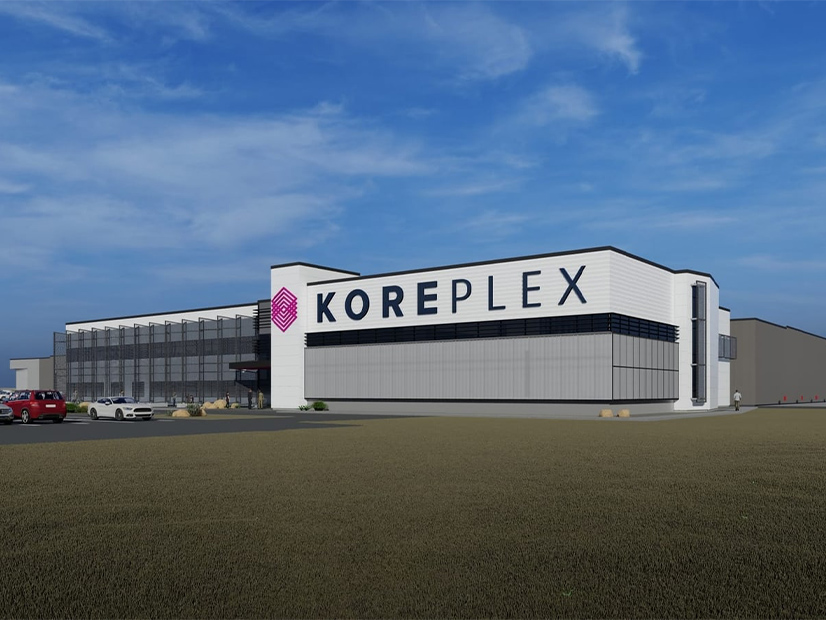
The Department of Energy’s Loan Programs Office (LPO) announced Friday it has made a conditional commitment for an $850 million loan to KORE Power to help the Idaho-based battery cell manufacturer construct a 1.3-million-square-foot plant in Arizona.
The KOREPlex facility, now under construction, will produce battery cells for both the electric vehicle and stationary storage markets. Located in Buckeye, Ariz., west of Phoenix, the plant will have an initial capacity to produce 6 GWh of battery cells, enough to power more than 28,000 EVs annually, according to the LPO.
“Onshoring battery manufacturing is critical to reducing America’s reliance on other nations, such as China, which currently dominates the industry and supplies many American companies with materials to resell foreign-made batteries,” the LPO announcement said.
Scheduled to begin commercial production in late 2024 or early 2025, the facility is being built with two manufacturing lines, one for lithium-ion nickel, manganese, cobalt (NMC) cells and one for lithium-ion iron phosphate (LFP) cells. While NMC batteries have been widely used in electric vehicles, some EV manufacturers are starting to use LFP cells, which are cheaper and do not use critical minerals such as cobalt.
The tradeoff is that they are not as energy dense as the NMC cells, which means EVs with LFP batteries may have a shorter range before they need recharging.
Tesla is now using LFP batteries in some of its Model 3 EVs, according to the company website. Ford is also planning to produce LFP batteries for some of its EV models at a plant in Michigan, the company announced in February.
KORE plans to target smaller EV equipment manufacturers requiring lower production volumes. It is working with local colleges and universities to train area residents for the 1,250 permanent jobs the factory is expected to create.
Domestic Content Controversy
The KORE Power conditional loan commitment is the seventh the LPO has made under its Advanced Technology Vehicles Manufacturing Program in the past year, the agency said, and comes at a time when EV and energy storage supply chains have become a political flashpoint.
Batteries are critical to the achievement of President Joe Biden’s goals to decarbonize the electric power grid by 2035 and to crank up EVs to 50% of all new car sales by 2030. Republicans in Congress — and some Democrats, such as Sen. Joe Manchin (D-W.Va.) — have criticized these targets as potentially increasing U.S. dependence on foreign supply chains for battery cells and other clean energy technologies.
China, in particular, dominates the lithium-ion battery supply chain, controlling 75% of all battery cell manufacturing and 90% of the manufacturing of anodes and electrolytes, key battery components, according to BloombergNEF.
Manchin crafted the EV tax credits in the Inflation Reduction Act with rigorous domestic content provisions intended to support the build-out of a domestic supply chain for lithium-ion batteries. To receive the full $7,500 tax credit, final assembly of an EV must be in North America and 50% of the value of battery components and 40% of the critical minerals in the battery must be produced, processed or manufactured in the U.S.
The domestic content percentages will increase every year, to 80% for critical minerals by 2027 and beyond and to 100% for battery components by 2029 and beyond, according to the Internal Revenue Service guidelines released in March.
Conditional commitments do not guarantee the LPO will award a loan. “Several steps remain for the project to reach critical milestones, and certain conditions must be satisfied before the department issues a final loan,” the agency said.
Other recent LPO conditional commitments have included a $2.5 billion loan to Ultium Cells to support new EV battery cell plants in Michigan, Ohio and Tennessee, and a $107 million commitment to Syrah Vidalia to expand a plant in Louisiana that produces graphite, another core component of lithium-ion batteries.
Ultium is a joint venture of General Motors (NYSE:GM) and LG Energy Solution.



